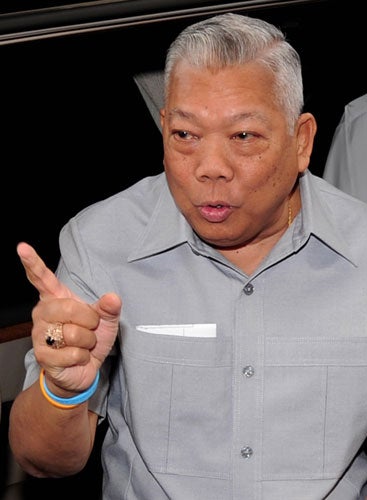Your support helps us to tell the story
From reproductive rights to climate change to Big Tech, The Independent is on the ground when the story is developing. Whether it's investigating the financials of Elon Musk's pro-Trump PAC or producing our latest documentary, 'The A Word', which shines a light on the American women fighting for reproductive rights, we know how important it is to parse out the facts from the messaging.
At such a critical moment in US history, we need reporters on the ground. Your donation allows us to keep sending journalists to speak to both sides of the story.
The Independent is trusted by Americans across the entire political spectrum. And unlike many other quality news outlets, we choose not to lock Americans out of our reporting and analysis with paywalls. We believe quality journalism should be available to everyone, paid for by those who can afford it.
Your support makes all the difference.Defiant Thai Prime Minister Samak Sundaravej refused to quit as his opponents vowed today to keep up a street campaign to unseat him, setting the scene for more political uncertainty.
Speaking on national radio amid widespread speculation that he would resign, Samak also dismissed talk that he would call a snap election to defuse the protests.
"I will not jump ship, I will be in control," he said in a 50-minute address.
"I can tell you I will not quit. I will not dissolve parliament. I will stay to protect democracy."
Later in the day, a government minister said the cabinet had in principle approved a plan to hold a referendum as a means to end the crisis. No further details were immediately available.
The anti-government People's Alliance for Democracy (PAD), barricaded inside the prime minister's official compound in Bangkok for a tenth day, vowed to stay until Samak gave up.
"As long as he insists on staying on, we will not go anywhere. It doesn't matter how many days or years, or even into the next life," PAD leader Sondhi Limthongkul told a crowd of cheering supporters.
The PAD, a coalition of businessmen, activists and academics, has been trying to unseat Samak for over three months, accusing him of being an illegitimate proxy for former premier Thaksin Shinawatra, ousted in a 2006 coup and now in exile in London.
Samak confirmed the resignation of Foreign Minister Tej Bunnag yesterday and suggested the career diplomat with close ties to the palace had felt pressure to quit.
"He has come under pressure from all fronts, so much so that his wife collapsed," he said.
Samak, 73, said it was time for Thais to choose sides.
"I want to avoid bloodshed. I want to avoid a crisis," he said, calling the PAD a lawless mob.
"The rest of the country must decide if they will join them."
Samak declared emergency rule after clashes between his supporters and anti-government protesters killed one man and injured 45, but the army has refused to use force to evict the protesters, saying it would only make the situation worse.
While that was interpreted as a rebuff to the government, a sputtering strike by public sector employees at utilities, the railways and airports has not helped the PAD's cause.
Thai Airways resumed flights to the southern town of Hat Yai today after it was closed twice in the past week by protests.
Analysts say various scenarios are possible, including Samak calling a snap election as a last resort, or caving in to the protesters and resigning.
Another possibility is revered King Bhumibol Adulyadej intervening in the crisis. Such a move would be unlikely to favour the government, even though it would be couched in nuanced terms, espousing the need for national harmony and stability.
But analysts say divisions in Thai politics had hardened so much that the life of this government was no longer the issue.
The more fundamental battle, they say, is between followers of Thaksin, a businessman-turned politician who commands a huge following in the countryside, against the traditional Bangkok-based royalist elite.
While most Thais see the king as a stabilising influence during times of crisis, he is 80 years old and a bout of illness last year served as a reminder of his advancing years and fragility.
The crisis has come as the country faces slowing growth and high inflation, and Thailand's heightened risk profile could prompt exasperated investors to park their money elsewhere, analysts say.

Join our commenting forum
Join thought-provoking conversations, follow other Independent readers and see their replies
Comments